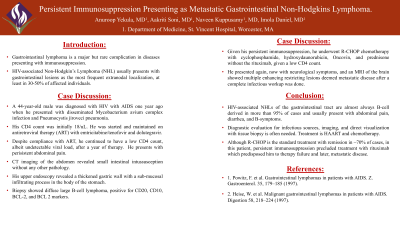Tuesday Poster Session
Category: Stomach
P4251 - Persistent Immunosuppression in HIV Presenting as Metastatic Gastrointestinal Non-Hodgkins Lymphoma
Tuesday, October 24, 2023
10:30 AM - 4:00 PM PT
Location: Exhibit Hall

Has Audio

Anuroop Yekula, MD
Saint Vincent Hospital
Worcester, MA
Presenting Author(s)
Anuroop Yekula, MD, Naveen Kuppusamy, MD, Aakriti Soni, MD, Imola Daniel, MD
Saint Vincent Hospital, Worcester, MA
Introduction: Gastrointestinal lymphoma is a major but rare complication in diseases presenting with immunosuppression. HIV-associated non-hodgkin’s lymphoma (NHL) usually presents with gastrointestinal lesions as the most frequent extranodal localization, at least in 30-50% of affected individuals.
Case Description/Methods: A 44-year-old male was diagnosed with HIV with AIDS one year ago when he presented with disseminated Mycobacterium avium complex infection and Pneumocystis jirocevi pneumonia. His CD4 count was initially 18/uL. He was started and maintained on antiretroviral therapy (ART) with emtricitabine/tenofovir and dolutegravir.
Despite compliance with ART, he continued to have a low CD4 count, albeit undetectable viral load, after a year of therapy. During this time, he was admitted to the hospital with persistent gastrointestinal symptoms with abdominal pain and diarrhea. CT imaging of the abdomen revealed small intestinal intussusception without any other pathology. Given the unusual and sudden presentation of the intussusception, he underwent an esophagogastroduodenoscopy and colonoscopy to evaluate for a luminal pathology.
His upper endoscopy revealed a thickened gastric wall with a sub-mucosal infiltrating process in the body of the stomach. Biopsy showed diffuse large B-cell lymphoma, positive for CD20, CD10, BCL-2, and BCL 2 markers. Given his persistent immunosuppression, he underwent R-CHOP chemotherapy with cyclophosphamide, hydroxydaunorubicin, Oncovin, and prednisone without the rituximab, given a low CD4 count. He presented again, now with neurological symptoms, and an MRI of the brain showed multiple enhancing restricting lesions deemed metastatic disease after a complete infectious workup was done. He is currently undergoing intra-thecal chemotherapy with rituximab for metastatic CNS lymphoma.
Discussion: HIV-associated NHLs of the gastrointestinal tract are almost always B-cell derived in more than 95% of cases and usually present with abdominal pain, diarrhea, and B-symptoms. Diagnostic evaluation for infectious sources, imaging, and direct visualization with tissue biopsy is often needed. Treatment is HAART and chemotherapy. Although R-CHOP is the standard treatment with remission in ~70% of cases, in this patient, persistent immunosuppression precluded treatment with rituximab which predisposed him to therapy failure and later, metastatic disease.
Disclosures:
Anuroop Yekula, MD, Naveen Kuppusamy, MD, Aakriti Soni, MD, Imola Daniel, MD. P4251 - Persistent Immunosuppression in HIV Presenting as Metastatic Gastrointestinal Non-Hodgkins Lymphoma, ACG 2023 Annual Scientific Meeting Abstracts. Vancouver, BC, Canada: American College of Gastroenterology.
Saint Vincent Hospital, Worcester, MA
Introduction: Gastrointestinal lymphoma is a major but rare complication in diseases presenting with immunosuppression. HIV-associated non-hodgkin’s lymphoma (NHL) usually presents with gastrointestinal lesions as the most frequent extranodal localization, at least in 30-50% of affected individuals.
Case Description/Methods: A 44-year-old male was diagnosed with HIV with AIDS one year ago when he presented with disseminated Mycobacterium avium complex infection and Pneumocystis jirocevi pneumonia. His CD4 count was initially 18/uL. He was started and maintained on antiretroviral therapy (ART) with emtricitabine/tenofovir and dolutegravir.
Despite compliance with ART, he continued to have a low CD4 count, albeit undetectable viral load, after a year of therapy. During this time, he was admitted to the hospital with persistent gastrointestinal symptoms with abdominal pain and diarrhea. CT imaging of the abdomen revealed small intestinal intussusception without any other pathology. Given the unusual and sudden presentation of the intussusception, he underwent an esophagogastroduodenoscopy and colonoscopy to evaluate for a luminal pathology.
His upper endoscopy revealed a thickened gastric wall with a sub-mucosal infiltrating process in the body of the stomach. Biopsy showed diffuse large B-cell lymphoma, positive for CD20, CD10, BCL-2, and BCL 2 markers. Given his persistent immunosuppression, he underwent R-CHOP chemotherapy with cyclophosphamide, hydroxydaunorubicin, Oncovin, and prednisone without the rituximab, given a low CD4 count. He presented again, now with neurological symptoms, and an MRI of the brain showed multiple enhancing restricting lesions deemed metastatic disease after a complete infectious workup was done. He is currently undergoing intra-thecal chemotherapy with rituximab for metastatic CNS lymphoma.
Discussion: HIV-associated NHLs of the gastrointestinal tract are almost always B-cell derived in more than 95% of cases and usually present with abdominal pain, diarrhea, and B-symptoms. Diagnostic evaluation for infectious sources, imaging, and direct visualization with tissue biopsy is often needed. Treatment is HAART and chemotherapy. Although R-CHOP is the standard treatment with remission in ~70% of cases, in this patient, persistent immunosuppression precluded treatment with rituximab which predisposed him to therapy failure and later, metastatic disease.
Disclosures:
Anuroop Yekula indicated no relevant financial relationships.
Naveen Kuppusamy indicated no relevant financial relationships.
Aakriti Soni indicated no relevant financial relationships.
Imola Daniel indicated no relevant financial relationships.
Anuroop Yekula, MD, Naveen Kuppusamy, MD, Aakriti Soni, MD, Imola Daniel, MD. P4251 - Persistent Immunosuppression in HIV Presenting as Metastatic Gastrointestinal Non-Hodgkins Lymphoma, ACG 2023 Annual Scientific Meeting Abstracts. Vancouver, BC, Canada: American College of Gastroenterology.
